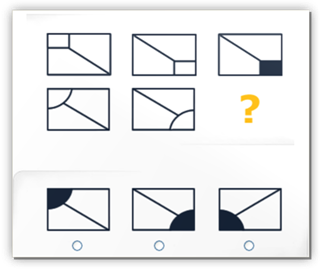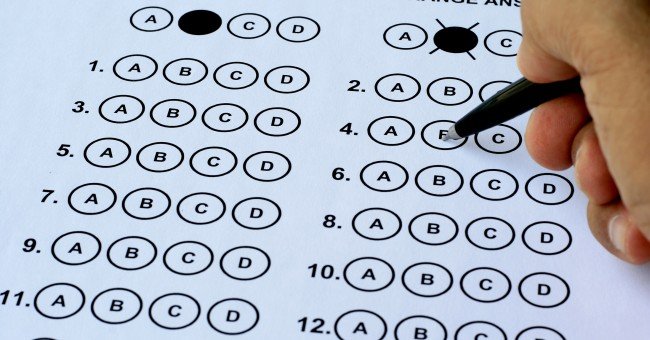Psychotechnical tests are used -among other contexts and purposes- in the selection processes of the companies, as well as in the selective tests. There are those who fear them and there are those who love solving those problems of logical or spatial reasoning. Be that as it may, their function always has the same objective: to detect aptitudes in the person, as well as their competences and psychological profile.

We are all clear that when measuring any type of psychological dimension or characteristic, it is always appropriate to make use of various techniques and diverse resources to obtain a wider range of information.
These tests offer only a score and a first approach to see if the skills shown by that person, are appropriate or not to the basic needs of a position. However, later these data will be contrasted with more scales and criteria to be able to carry out a broader and more accurate assessment.
Psychotechnical tests: purpose and fields of application
Psychotechnical tests consist of test-type questionnaires. The purpose is to choose an option among several possible answers quickly and accurately. With these tests, companies or any social organization can obtain information about the personality as well as any cognitive area that you want to measure: attention, memory, problem solving, verbal or spatial skills ...
Let's see below in what areas are often used on a day-to-day basis.
Psychotechnical tests are a part of the psychological evaluation and therefore should be applied and evaluated by psychologists specialized in this area.Areas of application
Selective processes in the workplace.
Educational scope: in order to assess the intellectual abilities of students, their evolution as well as their vocational preferences.
Clinical scope Psychotechnical tests are part of the usual work of the clinical psychologist, where they do not assess only personality styles or aptitudes. These resources are also necessary to make diagnoses, assess the presence or not of psychological alterations, dementias, etc.
Driving licenses and weapons licenses. In these areas, psycho-technical tests are essential. With them we value the abilities of attention, capacity of reaction or visuospatial aptitude in the drivers or if the person that aspires to possess a weapon is apt or not to make use of them.
It is a way to keep our cognitive processes up to date, to exercise attention, memory, spatial flexibility, verbal skills, etc. In our reach we have for example suitable games in any app of our mobiles and even test of free access in Internet.
Types of psychotechnical tests
We have all once passed through a selective process where those psychometric tests made us live a moment of tension or challenge. It must be said, however, that there are many people who daily train in these types of exercises as healthy as recommended for mere pleasure.
Let's see now what types of psycho-technical tests are those that are most often used:
Verbal aptitude test
- They measure the ability to understand and express concepts through words.
- There are exercises of spelling, of synonyms and antonyms, of verbal comprehension, incomplete sentences, orthographic rules ...
Numerical aptitude test
- This type of psychometric tests measure the ability to understand and work with numerical operations.
- We can find from the classic problems, as well as sums, subtractions, multiplications and divisions, fractions,
powers, roots, percentages, equations ...
Spatial aptitude test
The special aptitude tests are undoubtedly the most interesting. They invite us to differentiate shapes, volumes, distances, positions in space ...
Often appear incomplete figures, puzzles, figures that we must rotate mentally to understand their situation, etc.
Abstract reasoning test
- In this type of tests the ability of the person to observe and organize information in a logical manner is analyzed.
- We must therefore allow our deductive gifts to emerge by observing series of letters, figures, cards or coins to give correct answers.
Attention and retention test
- This type of test is very common in selective processes for jobs in which attention is very important. They can be factories or any type of industry where operators need to be attentive to their task.
- These tests therefore measure the ability to be attentive while performing a repetitive and monotonous task. For this purpose, visual memory exercises, reading memory, reading numbers or words, and then reproducing them ...
How can I successfully pass a psycho-technical test?
As we have pointed out before, there are many people who usually train in this type of competition, either for personal interest or because they have a selective process ahead of them. The ideal therefore is to get a large battery of tests and go home learning from the mistakes and in turn, performing them in the shortest time possible.
Also, it never hurts to follow these simple tips.
- Just as we train ourselves to perform this type of test effectively, we must learn to control and manage our anxiety in the selective test.
- We will read the instructions calmly, follow the examiner's rules and make sure we do not skip any page of the exercise.
- Analyze the examples offered in each exercise. Do not go ahead assuming you already know how to do it.
- Time is important So, if we get stuck in a question, we will move on to the next one, leaving the most complex ones for the end.
- Once the test is finished, review it.
- Remember that this type of psychotechnical tests are guided by logic. Make use of common sense.
To conclude, since these types of tests are becoming more common, it is never too easy to become familiar with them. Whether we have a selective process ahead or not, it is always healthy and beneficial to train this type of competence.
Thank you friend, this is all for today I hope to see you in my next publication.
Follow me | Upvote | Resteem
©All right reserved author
@joelgonz1982
